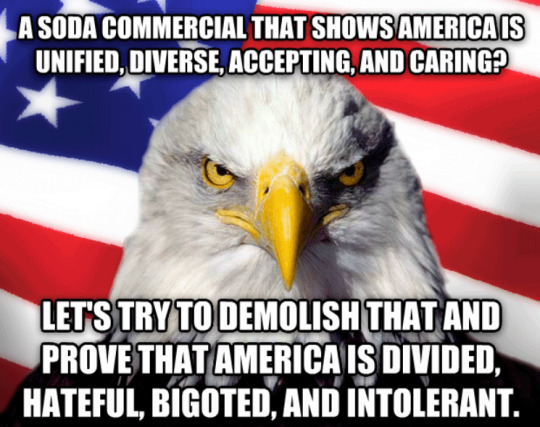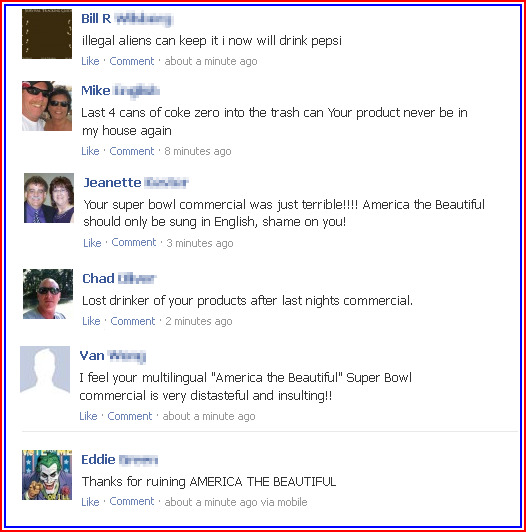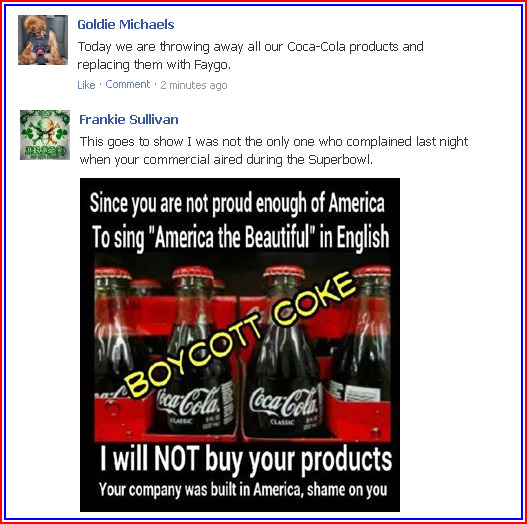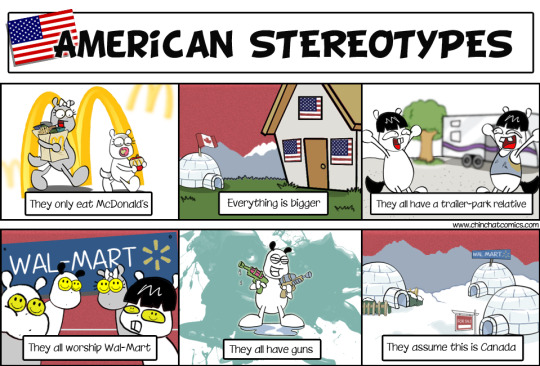Link
This is Nikki's curation. Trying to answer the question "What is American" is very difficult, and often raises additional questions about stereotypes and labeling. This site delves into answering as many of these questions as possible, while acknowledging that there is no one answer.
0 notes
Link
A resource I found useful when researching, as a supplement to class discussions/material. Many domain-specific terms are defined here that may be used in my posts.
1 note
·
View note
Video
Coca Cola has been embracing American diversity for a long time and I find it awesome that this commercial represents Americans is a culturally diverse light. American are from everywhere, with all kinds of religions and customs and it is beautifully represented in this commercial as is was in the 2014 Super Bowl commercial. People are connected throughout a nation that provides them with the freedom and liberty that it has promised to provide. America is home to many different people and they are the Americans of America
youtube
186 notes
·
View notes
Photo

The backwards thinking of everybody criticizing Coca-Cola’s SuperBowl ad…
375 notes
·
View notes
Quote
Why people are mad: The problem with the coke ad that came on during the football wasn’t that there was diverse people but that the song America the beautiful was sung in many different languages. Seen from a Public Relations perspective, part off me just says, they should of done the same song only in English, But with all the different people. But that was probably proposed but called “too bland” So, instead they did it in multiple languages. But that in my opinion was a mistake. In America, as we are extremely diverse in culturally, Georgia is very different from Minnesota which is also different from California and so on. Not only each state but many times different parts of a state have different kinds of cultures, such as South Georgia and North Georgia have major differences in culture. One of the few things that binds Americans together is English. Also sorta Spanish. Because of the recent large scale immigration from Spanish speaking countries, I think Spanish would’ve been acceptable too. With Coke as a brand trying to infiltrate our culture with many languages, that’s aren’t really seen as patriotic at all and instead It’s seems offensive. There isn’t a lot all Americans can agree on and feel like one group, but English speakers is one. Having Spanish as a second language, I know those who only speak Spanish and they aren’t really seen as American. Same with those who only speak Hindi, and other languages. Coke seeming like they’re trying to change that, even if they aren’t, seems take offensive to one of the only things that binds Americans. Now, I’m sure if it was a different song, like “Don’t worry, be happy” Americans wouldn’t be mad, it would be seen as a universal ad, not a patriotic one. Which is possibly what they should have done. Or with the tag line #AmericaIsBeauitful they should have only done it in English and Spanish could of stunk in there too, without offending America’s culture
http://mylifeinmegabytes.tumblr.com/post/75516890601/the-problem-with-cokes-superbowl-ad (via sarayuknits)
1 note
·
View note
Text
A Tale of Two Theories
Are members of (non-White) ethnic enclaves offered the same types of jobs/opportunities as their (White) “American” counterparts? Does this (in)opportunity motivate the constant changing of the term White and non-White? Do ethnic enclaves help their “citizens”, or does capitalism bind and constrain them? And how does this effect who chooses (for those who have that power) exists within ethnic enclaves?
In my previous post “Names and wages: Being Brad Ain’t Bad”, I began examining evidence for how those who de-stratified themselves from their ethnic background were eventually able to obtain greater economic success “on the outside” – in the so-named everyday, mainstream America that our blog is deconstructing. I also previously worked through my thoughts on how the ethno racial landscape of America (from a power struggle perspective) is binary: White and non-White – and these are dynamic, often clashing, groups!
All of this has motivated me to pose the following questions:
Are members of (non-White) ethnic enclaves offered the same types of jobs/opportunities as their (White) “American” counterparts? Does this (in)opportunity motivate the constant changing of the term White and non-White? Do ethnic enclaves help their “citizens”, or does capitalism bind and constrain them? And how does this effect who chooses (for those who have that power) exists within ethnic enclaves?
Two theories from literature gave interesting insight to these questions (and convinced me that they are well-studied problems) -
Rational Choice Theory: In The Sociology of Ethnicity (Ch. 7), there is an in-depth look at the theory of choices in this context. While many of the references and ideas might be a bit involved, I do find it encouraging that these types of discussions have been had before, perhaps starting with Marx, but likely before.
Split Market Theory: I referred to Marxism and Race, regarding Edna Bonacich’s Split Market theory. To me, this marks the ethnic enclave as an oppressed group with unequal opportunities within; “easy” targets for cheap labor,
the backbone of a city that met the challenge of progress
Split Market Theory explains one idea for why certain ethnic groups struggle to find the same “American” opportunities as others, as it is a cause for class antagonism.
We may not be able to “change the world” (by preventing class antagonism), but if we as individuals can increase our awareness and support (say, by not uprooting ethnic enclaves) to all Americans, we step forward as Americans.
3 notes
·
View notes
Link
What has, will the ethnic enclave become? And also what has it been? A real-world look at some very relevant points in our close neighbor Vancouver.
“chinatowns have persisted as havens for low-income immigrants and workers, not only because of the continued need for affordable and culturally appropriate services and goods, but also because of the many people fighting to maintain their existence.”
“Recent luxury and high-end developments in each city’s Chinatown have directly and indirectly threatened both current residents’ and future immigrants’ ability to live, work, shop, and participate in the community and cultural life of these historic neighbourhoods,” reads the report. The result, report co-author Andrew Leong told the BBC earlier this month, is “a sanitized ethnic playground for the rich to satisfy their exotic appetite for a dim sum and fortune cookie fix.”
2 notes
·
View notes
Link
This video and display by national geographic is one that I truly enjoy. The reason being, that you see an organization going out of their way to enlighten. With the idea of white America always floating around, it’s really refreshing to see a group making sure that idea is put to rest. The fact of the matter is the images by national geographic do represent the image of the American. I live in this country and can say that it was a pretty good take on what the American is growing to look like. Obviously, national geographic did not cover all of the appearances in America, but they made a valiant effort. In my English class, this same idea came up in many texts. Gish men addresses it perfectly in “Mona in the Promised Land” when Mona is forced to explain her heritage due to the fact she is Asian. Why should Mona have to explain? Why cant she just be American? The reason being that it still has to be written about. The reason these kinds of texts and videos are made is due to ignorance. America as a whole really struggles with its image. It’s a country that possesses so many but is often displayed as just one. Everyone reading this knows what that one image is. The destruction of this image is necessary, just as the promotion of this national geographic image is.
0 notes
Photo
I love America. I have always loved the way that you can go to different places in America and feel completely like you are in another country. I love that at the hospital they ask you what language you would like your translator to speak and I love the lengthy list of languages available. I love that I need to press 1 for english. I love that in order to eat in Miami you need to understand a cuban accent. I love that on monday I ate indian food, while my husband ate Mexican food. I love that culturally speaking, America is so diverse that we don't even know all the nations we have represented in this beautiful nation. We have had people migrate from another nation, believing in freedom so dearly that they gave up their life fighting for our freedom. In order for us to live in liberty, without limits or restraints. We have had people be burned in buses, gassed on the streets in order to share the same bathrooms and classrooms. We have had nations reach to us, and us to them in times of need. America isn't english speaking, blue eyed, blonde haired christians. America is everyone from everywhere, doing life together, crossing barriers together, holding different colored hands than their own. We strive for success together.
"For every native of every place is a potential tourist, and every tourist is a native of somewhere".
-Jamaica Kincaid




Kind of sad that so many ‘Mericans get this worked up because a song wasn’t sung in English. Too bad they can’t seem to get this worked up about fighting poverty or fighting for equal rights.
4K notes
·
View notes
Video
Coca Cola really out did themselves with this commercial. Yet the purity of this commercial was not met with much love as we have seen in the media. People bashed and boycotted coke for their love of American Diversity. It is sad and upsetting that the hate that this commercial received was mostly from Americans, who live among the diversity and secretly hate it. In a nation where a walk down the street will cause you to interact with different cultures, ideas and customs you would think that people would be more accepting of a commercial where America the Beautiful is being sung by the people with different languages, cultures, ideas and customs. It is sad to think that your home in America and your love for America is only accepted when you are speaking English and engaging in "American" activities. Assimilation is not what makes you American. English is not what makes me American. Families come from all parts of the world to give their children a better life, a free life, a liberal life. I hate that this commercial was not met with love and seen for the beauty of its love for diversity. Coke I applaud you. America is colorful, America e linda.
youtube
The only thing more beautiful than this country are the people who live here. Watch this and discover why #AmericaIsBeautiful.
4K notes
·
View notes
Photo

The founding fathers are always a tough topic to bring up. Many Americans wont listen to any scrutiny due to the fact if how hyped up these figures are. By hyped up I mean the bullshit that’s fed to us throughout our early schoolings. Throughout elementary school and up until high school these men are regarded as almost god like, in the sense that everything they did was great and great for the nation. But despite the fact that this reputation couldn’t be farther from the truth, is the name founding fathers even correct? Is this LABEL something that Americans need to stop using? Before Europeans came over to exploit North America, there was a system of government in America. These men and women were not ruthless savages, but people who lived by rules and regulations and under a form of government. These men in this system who ran it for years and established early American culture, could be the only logical choice for founding fathers. It would be simple ignorance to not acknowledge early non European American government leaders as the founding fathers of America. The sad fact is these men are by no means regarded with the respect they are due. What does this tell us about American culture? Why does our country refuse to recognize knowledge that we know to be true? This is simply an example of how white dominance effected America and how the people in it think. This trait of consent to false ideals is one that is now seeming to become more common…
http://photoexplanationsofwhatever.blogspot.com/2011/02/original-founding-fathers-of-america.html
0 notes
Text
Labeling affects the way people view themselves, others, and the world around them. In this post, the writer explains that if “you” are an individual that doesn’t want to be labeled, then okay. But if you’re a person who says that labels aren’t important specifically because you don’t want to acknowledge that they exist or because you don’t want to recognize that different groups are treated in different ways by society, then forget about it.
Labeling exists in society. People are labeled based on appearance, characteristics, personality traits, actions, etc. If it can be labeled by people, it has been. Ignoring them doesn’t make them go away. On the other hand, recognizing that labels are simply that – labels – and not the actual person themselves, allows society to start transforming their ways of viewing one another.
One word cannot define a person. Even ten words can’t define a person. But people try to do this anyway. They feel that by placing labels on people, they can group them together and perhaps make the world feel like a smaller place or just devalue the essence that it means to be a human being. Some people don’t like to accept the fact that everyone is unique; everyone is different. By placing a one-word label on a person, there is a dehumanizing quality that results. They are no longer unique, human, eccentric individuals, but rather a word that people can either choose to respect or degrade.
Why "Labels aren't important"
If you tell me “labels aren’t important” because you don’t want to define yourself with them, or because they don’t work for you, then I will support you 100%.
But if you tell me “labels aren’t important” because you don’t want other people to be able to use labels to define themselves, or because you don’t want to acknowledge that different groups of people get treated differently by society, then I don’t like you and I don’t want you near me.
347 notes
·
View notes
Photo

http://graphics8.nytimes.com/images/2007/05/13/books/vizz600span.jpg
4 notes
·
View notes
Photo

http://3.bp.blogspot.com/-1b0VWM6i-WQ/UXawnhoxCYI/AAAAAAAAAFk/O69_8Y-h_88/s1600/chinchilla233.png
3 notes
·
View notes
Photo
How it should be.

121 notes
·
View notes
Text
Names and wages: Being Brad Ain't Bad
What sorts of people were most likely to Americanise their name? The most boring explanation is one concerning “imperfect information”: only some migrants realised the benefit of Americanisation. But the authors find little evidence for that. Instead, they show that migrants facing the greatest barriers to occupational mobility were most likely to Americanise and reaped the highest returns from doing so. People who came from more "exotic" countries, or who could not migrate to better jobs, benefited more from Americanisation than better-off migrants. These migrants had to jettison their individual identity for labour-market success.
- The Economist
This article presents a survey of an economics paper researching the economic impact of name changes (“Americanization”) for 1930s American immigrants. If we are to trust their methodology and conclusions, these are very interesting findings (especially in the scope of our collection here, and our semester-long class discussions). They suggest that migrants who are labeled as non-White – a label that has changed over time – benefitted from distancing their ethnicity.
What’s in a name? Apparently, a tie to an ethnic heritage which may or may not be acceptable at the given time. Closely tied ethnic groups, entire ethnic enclaves, have all depended on an occupation to survive in America; the acceptance of the labor market. Who decides who moves up the economic ladder? Do they not recruit in the enclave?
Is the ethnic enclave then only a place for non-Americans?
WHAT IS AMERICAN – a lack of ethnicity?
To become American, or to prosper in America, is it necessary to “jettison individual identity”?
This study found that this was true for the non-White migrants of the 1930s. But, white migrants did not necessarily benefit from changing their name. While quite a bit has happened for race in America since then (i.e., Civil Rights Movement), what could we learn from this? That white migrants didn’t need to Americanize? Not quite.
That racism was, and still is, a barrier to (not) attaining economic success in the U.S. for those groups labeled non-White. This study reminds us that the non-White group is one that has changed. Some groups, such as Italians, would rarely be considered non-White today like in the 1930s. It’s hard to fully recognize racial stratification today without looking into previous eras for its existence.
3 notes
·
View notes
Text
The editor of the Cleveland News printed the following letter from Raoul Spoleti-Bonanno in June of 1937 concerning recent anti-Italian editorials:
Are we to understand that a good American is one who condemns everything not reflecting American political, economic, moral, and philosophical points of view? ...
- Italian-Americans & Their Communities of Cleveland
2 notes
·
View notes